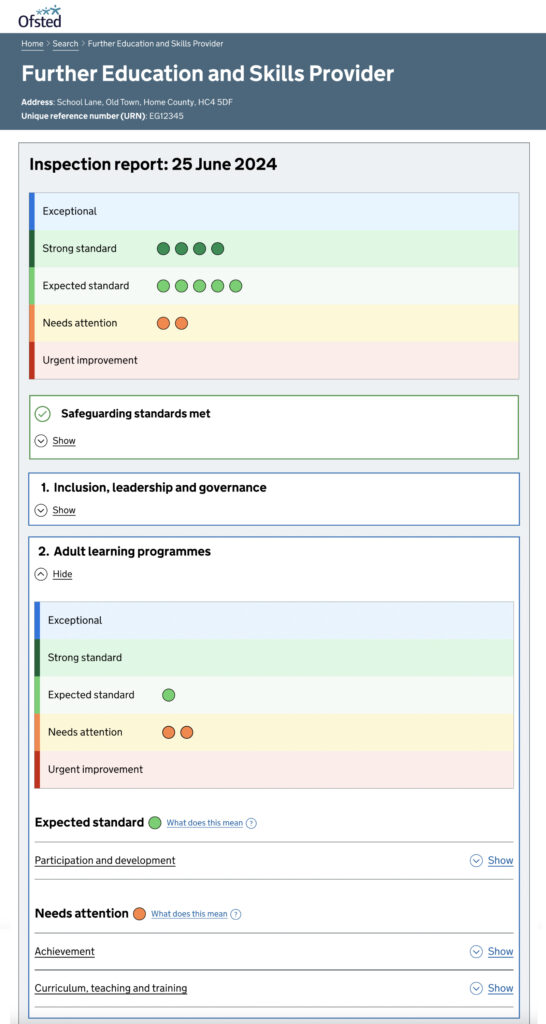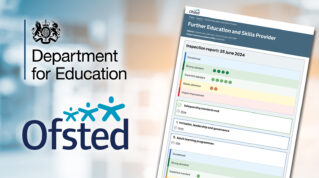Ofsted has cut the number of areas of judgment for FE providers and colleges and renamed its colour-coded five-point grading scale following a consultation on report card reforms.
But an independent review warns that the “stress” and “high stakes” consequences of inspection are unlikely to change for education staff and leaders once the reforms are fully embedded.
Unions have said the tweaks announced today are “minor and cosmetic changes to a flawed rationale” and fear the reforms are a “recipe for professional burn-out”.
Meanwhile, the watchdog has taken aim at a “small but vocal minority” who are “calling for reduced accountability or removing grading altogether” and promised to “not hesitate” to call out providers that are failing learners.
Ofsted’s reforms, first proposed in a consultation launched in February and refined today after 6,500 responses, were prompted by a coroner’s ruling in 2023 that an inspection of Caversham Primary School in Reading “contributed” to the suicide of its headteacher, Ruth Perry.
The inspectorate believes its reforms will offer “more granularity and nuance” about a provider’s performance and help to “raise standards” for learners.
Chief inspector Sir Martyn Oliver said: “Children deserve the best possible education; their parents deserve the best possible information and education professionals deserve to have their work fairly assessed by experts. The changes we are presenting today aim to achieve all three of these things.”
Reformed inspections will start from November 10. There will be no routine inspections in the first half of the autumn term for state-maintained schools and FE and skills providers.
From ‘urgent improvement’ to ‘exceptional’
Ofsted’s consultation proposed that overall effectiveness judgments would be removed, but multiple areas would be cast along a colour-coded scale of ‘exemplary’, ‘strong’, ‘secure’, ‘attention needed’ and ‘causing concern’.
But amid fears this wording was “confusing” and “too harsh”, the watchdog has decided to change this terminology to:
o Urgent improvement (red)
o Needs attention (orange)
o Expected standard (green)
o Strong standard (dark green)
o Exceptional (blue)
This replaces the current ‘outstanding’, ‘good’, ‘requires improvement’ and ‘inadequate’ grades.
In a change from the initial proposals, providers will not be asked to submit case studies for approval to gain an ‘exceptional’ grade. Instead, inspectors will “evaluate ‘exceptional’ practice by applying the toolkit, subject to the usual quality assurance and consistency checking”.
An area will be graded as ‘urgent improvement’ when Ofsted evaluates a provider to be “failing overall or failing a significant group of children or learners” or if the watchdog identifies “serious, critical or systemic shortcomings in practice, policy or performance, against professional/statutory or non-statutory guidance and requirements”.
The inspectorate said: “If we identify that standards for children and learners must be urgently improved, we will not hesitate to call it out.”
As previously announced, there won’t be an overall effectiveness grade for FE and skills providers from now on.

Maximum evaluation areas reduce from 20 to 16
For FE and skills providers, Ofsted’s consultation originally proposed up to 20 graded areas – double the number of previous reports.
To reduce this, the watchdog has merged ‘developing teaching and training’ with ‘curriculum’ to create a single ‘curriculum, teaching and training’ evaluation area.
Ofsted will introduce three evaluation areas for each provider as a whole: ‘inclusion’, ‘leadership and governance’ and ‘safeguarding’.
Providers will then be judged on their ‘curriculum, teaching and training’, ‘achievement’ and ‘participation and development’ for each provision they offer including ‘young people’, ‘adults’, ‘apprenticeships’ and ‘high needs learners’.
Colleges and designated institutions will continue to be judged on their contribution to meeting skills needs but in a change from the consultation, this area will be judged on the new colour-coded scale like across other remits instead of the current ‘limited, reasonable or strong’ system.
Safeguarding will either be judged ‘met’ or ‘not met’ at provider level, as is current practice.
So for an FE college offering courses to young people, adults, apprentices and learners with high needs, this would see the number of grades they receive rise from the current 10 to 16.
The detailed report card will sit below an overview grid and provide a narrative for each evaluation area. It will explain strengths and areas for development.
Watch a video on how an FE and skills report card will look.
Click here for the new FE and skills inspection toolkit and guide.
New ‘suspend and return’ policy
A new “suspend and return” policy was introduced last September for schools that lets inspectors pause an inspection to allow a school to resolve safeguarding, “where that is the only issue in the school”.
This will now be adopted in FE and skills inspections.
Ofsted said: “Inspectors can suspend an inspection to allow a provider to resolve issues with safeguarding within three months, where there are no concerns in other evaluation areas.”
Reforms won’t reduce ‘stress’ and ‘high stakes’
Ofsted commissioned Sinéad Mc Brearty, chief executive of well-being charity Education Support, to carry out an independent review of the impact of its inspection reforms on the workload and well-being of the education workforce.
She concluded that stress related to inspection is “unlikely to materially change whilst the ‘high stakes’ consequences remain broadly intact” despite the reforms.
In response, Ofsted said: “We recognise that inspections can be stressful. That is to some extent inevitable in an inspection system fundamentally aimed at ensuring that proper standards of education and safeguarding are in place, and that parents are fully informed on those matters.
“However, we are determined to minimise this stress where we can. We fully believe the changes we have made do this, and that they will lead to a more informative, transparent and fairer system of reporting that better serves children and learners, parents and carers, and professionals and providers.”
It is not yet clear what accountability measures the Department for Education will attach to Ofsted results under the new report card system.
Ofsted vs unions
Ofsted’s consultation response goes heavy on parental backing for its reform proposals.
The watchdog said independent polling from YouGov showed almost seven out of 10 of parents surveyed said they prefer the new-look report cards to Ofsted’s current inspection reports. And just 15 per cent said they preferred the old system.
Ofsted also recognised that a “small but vocal minority are calling for reduced accountability or removing grading altogether”.
“We do not agree,” the inspectorate said, and added: “The changes we are introducing are fair and empathetic for professionals, but without losing sight of our core purpose to raise standards.”
Pepe Di’Iasio, general secretary of the Association of School and College Leaders, hit back.
“Inspections should do two things – provide parents with an accurate reflection of a school’s performance while doing so without placing an excessive burden on staff. Ofsted’s plans achieve neither objective,” he said.
“The tweaks made to its proposals following the consultation period are just that – minor and cosmetic changes to a flawed rationale. To make matters worse, the planned introduction of this system is far too rushed and gives little time to prepare for a huge change in how they will be inspected.”
Di’Iasio warned the “consistency” of Ofsted judgments will continue to be “unreliable” and the new inspection system will place a “huge amount of stress on school and college leaders and their staff because they will face so many judgements across so many areas”.
“Let’s remember that this entire process began with the suicide of a headteacher under the previous inspection system. Yet here we are with a reformed system which appears to be even worse. We are gravely concerned about the welfare of leaders and teachers as well as the impact on recruitment and retention,” he added.
Daniel Kebede, general secretary of the National Education Union, said Sir Martyn Oliver “has failed” in his attempt to bring in a system that reduces pressure.
“Removing the single word judgment was meant to be a powerful revolution, but this makes things much worse. More of the same. More pressure. More ranking and competition. More labels.”
He added that NEU “completely reject that a Nando’s style 1-5 grading scale is good for children or parents”.
A letter has been sent to education secretary Bridget Phillipson today signed by unions and a host of national organisations, ex-school inspectors and Ruth Perry’s sister Julia Waters requesting that the government intervenes and delays the roll out of new Ofsted system “before it’s too late”.
David Hughes, CEO of the Association of Colleges said: “We will only know if this is going to work from the first inspections implementing it.
“We remain concerned about the speed of implementation at the busiest time of the year for colleges, with enrolment and induction underway of new students at the start of the academic year.”
Click here for FE Week’s speed-read on the new grades and inspection categories















Your thoughts